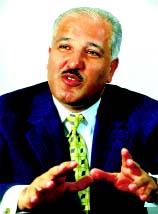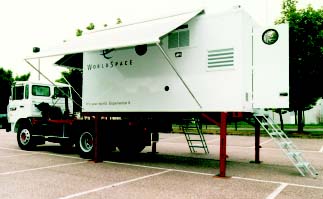
Nader Modanlo
Photo: Jud McCrehin/Space News
|
Final Analysis is an aerospace and telecommunications company formed in 1992 on a commitment to space commercialization through low-cost access. The company provides end-to-end turnkey spacecraft operations and launch services. |
Final Analysis is in the process of deploying a constellation of global low-Earth orbiting (LEO) satellites to provide digital data services to a wide range of users. Our global FAISAT satellite system will provide consumers, governments and industries (transportation, environmental, utility, oil and gas, agribusiness, automotive and others) with low-cost data information services. These services include: personal messaging (two-way paging and E-mail) and voice mail, file transfers, mobile asset management and tracking, remote monitoring and control, as well as data acquisition.
Let me just explain about some of these services. Our ground terminals will be equipped with global positioning systems (GPS) receivers to provide quick, accurate low-cost positioning information for all sorts of cargo, shipping containers, rail cars, barges and trucks. In addition, the terminals will be equipped with microprocessors for data monitoring and control. With these terminals, one can monitor crop conditions and feed supplies on large farms, climate conditions at weather stations, water quality conditions, consumable supplies in vending machines and copying machines, point-of-sale reports from retail stores and a wide variety of inventory management data.
Our satellite system falls in the category of what ITU calls non-voice non-geostationary systems that operate below 1 GHz. These systems are also known as "little LEO" systems because of the small size of the satellites and the relatively low cost of system implementation. The term little also helps to distinguish those systems that operate below 1 GHz and are optimized for data, from "big LEO" systems which operate above 1 GHz and are optimized for voice.
We plan to deliver these new digital data information and messaging services at the beginning of the year 2001. A number of studies on our type of applications, as well as financial analysts predict market revenues between USD 2 and 5 billion in just a few years.
We believe that in order to successfully deploy a constellation of satellites, we must establish a team of strategic partners. This is not because Final Analysis is a small company. We believe that any company, whatever the size, cannot go forward alone. So our partnership with General Dynamics is very significant. In January this year, Final Analysis and General Dynamics announced a partnership valued at USD 20 million. In August, we selected General Dynamics as our partner for overall system engineering and integration, and as prime contractor for the ground segment of the Final Analysis global FAISAT satellite system. General Dynamics has full responsibility for end-to-end performance of the FAISAT system, integrating the space and ground segments and user network. We place great importance on this world-class company to assure that all system parts work together to satisfy the end user. The value of this expanded strategic partnership is 75 million which includes a contract from Final Analysis to General Dynamics and an additional equity investment by General Dynamics in Final Analysis.
The significant part of this partnership is that in an environment where there is concern about new or future satellite systems, winning each other's trust has been a key factor. In this context, our partners are as comfortable with our approach to the market as they are with our system. And this is an important message to the financial and user communities and to the industry at large, that not all systems should be looked at in the same way. With this recent announcement, we hope that other entrepreneurial companies of all sizes around the world can join in our endeavour to implement the new digital data services.
In a world where the majority of countries are developing and a minority are industrialized, in general, there is the impression in the developing world that anything related to space communications should be left to the industrialized nations. I am here to witness that participation in the space-based industry is not exclusive to "giant" multibillion dollar entities. Companies or countries, independent of size, can participate in this industry. In business and in other aspects of life, the key to success is commitment. You can be successful if you are innovative, focused and committed for the long term.
Our main focus will be the rural and remote areas where the communications gap is huge. Many people read about developing countries and try to understand the situation. I was born in a developing country (Iran) and I am very sensitive to the needs of the developing world. As a player in this emerging industry, I will be promoting low-cost access to new technologies. I am committed to the commercialization of space and the creation of new opportunities for developing countries to gain the benefits of global mobile personal communications by satellite (GMPCS).
Let me give you an example. Two-way personal messaging and voice mail via the Final Analysis FAISAT satellite system can provide rural digital data communications virtually instantly. This system can then deliver new services to health and education centres, as well as to agricultural sites in small villages that may be lacking electricity or telephony.
This means that life-saving information related to health, for example, can be collected, analysed and disseminated fairly quickly, facilitating medical diagnoses of complex cases from different medical centres. People in areas not otherwise served by telecommunications can also receive early warnings of natural hazards such as hurricanes, earthquakes, volcano eruptions and other environmental and climatic conditions or disasters.
In addition, our FAISAT satellite system's voice mail service could provide a solution for people who may be unable to read or write, as our service would relay recorded speech after it has been digitized into a data transmission.
Clearly, developing countries have significant needs for basic communications and we hope to contribute, through these services, to closing the communications gap and delivering on the promise of GMPCS.

Nader Modanlo
Photo: Jud McCrehin/Space News
We have been big supporters of the GMPCS process since the very beginning, when ITU held its first World Telecommunication Policy Forum on this topic in October 1996. The fact that the GMPCS Memorandum of Understanding has now been signed by a number of signatories from government and industry sends an important message that the world is waiting for these new services. My view is that affordability of user terminals and service is the major factor to the receptivity of our new data information services, and I am committed to bringing low cost services to mass markets.
Thanks to the GMPCS-MoU, we will be able to work with national service providers in different countries to deliver digital data services to complement, extend coverage, augment and integrate (not replace!) existing terrestrial and wireless network services around the world.
More than a year has gone by since Africa Telecom. Under the signature of "African Renaissance", one promise made in Johannesburg has been fulfilled.
At the opening ceremony, WorldSpace Chairman, Noah Samara, announced a major investment, in Africa alone, intended to create a new digital electronic medium to which every African on the continent will gain access.
The first satellite known as AfriStar has been launched. The receivers are available on designated markets. In addition, programmes on information and the content on this satellite have been developed mostly by African entrepreneurs for African consumption.
At Telecom 99, WorldSpace is not spending money on parties or an extravagant exhibition stand. Instead, it is investing in a new concrete project known as "Worldtelekiosks for rural and remote areas in Africa". With the support of ITU's Telecommunication Development Bureau (BDT), WorldSpace is inviting other industries to become partners in this initiative.
What is a telekiosk? You can see it in hall 7 at Palexpo!

A "telekiosk" is a mobile or fixed unit providing basic telecommunications and WorldSpace services to populations in rural and remote areas in Africa. It offers both content and telecommunication services and responds to the needs of local communities. The project is based on a sustainable business plan.
A "mobile telekiosk" travels to survey and test the markets, train people and find the right services to be provided to local needs.
The "fixed telekiosks" are standard units in design and operations but with "on-demand" features and services to be deployed in chosen locations. They are owned by the community. The fixed telekiosk could become a centre for community development for social and cultural activities. If run by women, it will strengthen the women's role in rural society.
The mobile telekiosk prototype, built by Thomson Broadcast, will be showcased at Telecom 99.
It is composed of the following:
The pilot project will be launched in Mali in November 1999, with the Société des télécommunications du Mali (SOTELMA)
as the telecommunications partner. After Mali, the mobile telekiosk will be introduced in other African countries.
|
For more information on the project, please contact: "Roxana Dunnette, Senior Business Adviser, WorldSpace, 25, rue Plantamour, CH-1201 Geneva (Switzerland). Tel.: +41 22 738 2545. Fax: +41 22 738 2113. E-mail: rdunnette@worldspace.com ". |